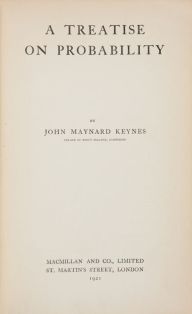The reaction of human beings to the truly unknown is fundamentally different from the way they deal with the risks associated with a known situation and environment … In realistic, real-time settings, both economic agents and researchers have a very limited understanding of the mechanisms at work … In trying to add a degree of complexity to the current core models, by bringing in aspects of the periphery, we are simultaneously making the rationality assumptions behind that core approach less plausible … The challenges are big, but macroeconomists can no longer continue playing internal games … I suspect that whatever the solution ultimately is, we will accelerate our convergence to it, and reduce the damage we do along the transition, if we focus on reducing the extent of
Topics:
Lars Pålsson Syll considers the following as important: Economics
This could be interesting, too:
Lars Pålsson Syll writes Schuldenbremse bye bye
Lars Pålsson Syll writes What’s wrong with economics — a primer
Lars Pålsson Syll writes Krigskeynesianismens återkomst
Lars Pålsson Syll writes Finding Eigenvalues and Eigenvectors (student stuff)
The reaction of human beings to the truly unknown is fundamentally different from the way they deal with the risks associated with a known situation and environment … In realistic, real-time settings, both economic agents and researchers have a very limited understanding of the mechanisms at work … In trying to add a degree of complexity to the current core models, by bringing in aspects of the periphery, we are simultaneously making the rationality assumptions behind that core approach less plausible …
The challenges are big, but macroeconomists can no longer continue playing internal games … I suspect that whatever the solution ultimately is, we will accelerate our convergence to it, and reduce the damage we do along the transition, if we focus on reducing the extent of our pretense-of-knowledge syndrome.
Caballero’s article underlines — especially when it comes to forecasting and implementing economic policies — that the future is inherently unknowable, and using statistics, econometrics, decision theory or game theory, does not in the least overcome this ontological fact.
Uncertainty is something that has to be addressed and not only assumed away. To overcome the feeling of hopelessness when confronting ‘unknown unknowns’, it is important — in economics in particular — to incorporate Keynes’s far-reaching and incisive analysis of induction and evidential weight in A Treatise on Probability (1921).
 According to Keynes we live in a world permeated by unmeasurable uncertainty – not quantifiable stochastic risk – which often forces us to make decisions based on anything but “rational expectations.” Keynes rather thinks that we base our expectations on the confidence or “weight” we put on different events and alternatives. To Keynes, expectations are a question of weighing probabilities by “degrees of belief,” beliefs that often have preciously little to do with the kind of stochastic probabilistic calculations made by the rational agents as modelled by “modern” social sciences. And often we “simply do not know.”
According to Keynes we live in a world permeated by unmeasurable uncertainty – not quantifiable stochastic risk – which often forces us to make decisions based on anything but “rational expectations.” Keynes rather thinks that we base our expectations on the confidence or “weight” we put on different events and alternatives. To Keynes, expectations are a question of weighing probabilities by “degrees of belief,” beliefs that often have preciously little to do with the kind of stochastic probabilistic calculations made by the rational agents as modelled by “modern” social sciences. And often we “simply do not know.”
How strange that social scientists and mainstream economists, as a rule, do not even touch upon these aspects of scientific methodology that seems to be so fundamental and important for anyone trying to understand how we learn and orient ourselves in an uncertain world. An educated guess on why this is a fact would be that Keynes concepts are not possible to squeeze into a single calculable numerical “probability.” In the quest for measurable quantities, one puts a blind eye to qualities and looks the other way.
So why do economists, companies and governments continue with the expensive, but obviously worthless, activity of trying to forecast/predict the future?
Some time ago yours truly was interviewed by a public radio journalist working on a series on Great Economic Thinkers. We were discussing the monumental failures of the predictions-and-forecasts-business. But — the journalist asked — if these cocksure economists with their “rigorous” and “precise” mathematical-statistical-econometric models are so wrong again and again — why do they persist wasting time on it?
In a discussion on uncertainty and the hopelessness of accurately modelling what will happen in the real world — in M. Szenberg’s Eminent Economists: Their Life Philosophies — Nobel laureate Kenneth Arrowcomes up with what is probably the most plausible reason:
It is my view that most individuals underestimate the uncertainty of the world. This is almost as true of economists and other specialists as it is of the lay public. To me our knowledge of the way things work, in society or in nature, comes trailing clouds of vagueness … Experience during World War II as a weather forecaster added the news that the natural world as also unpredictable.
An incident illustrates both uncer-tainty and the unwilling-ness to entertain it. Some of my colleagues had the responsi-bility of preparing long-range weather forecasts, i.e., for the following month. The statisticians among us subjected these forecasts to verification and found they differed in no way from chance. The forecasters themselves were convinced and requested that the forecasts be discontinued. The reply read approximately like this: ‘The Commanding General is well aware that the forecasts are no good. However, he needs them for planning purposes.’
